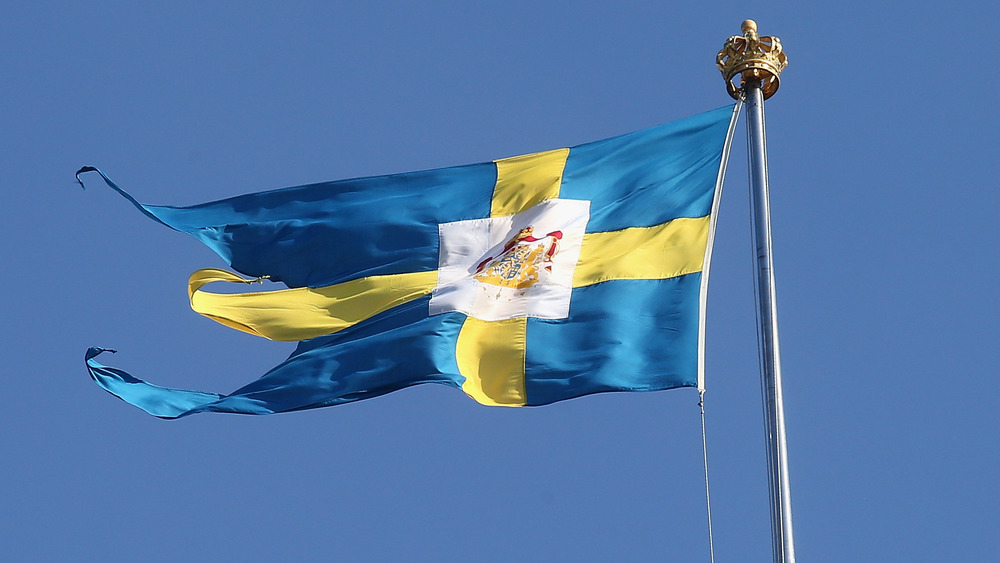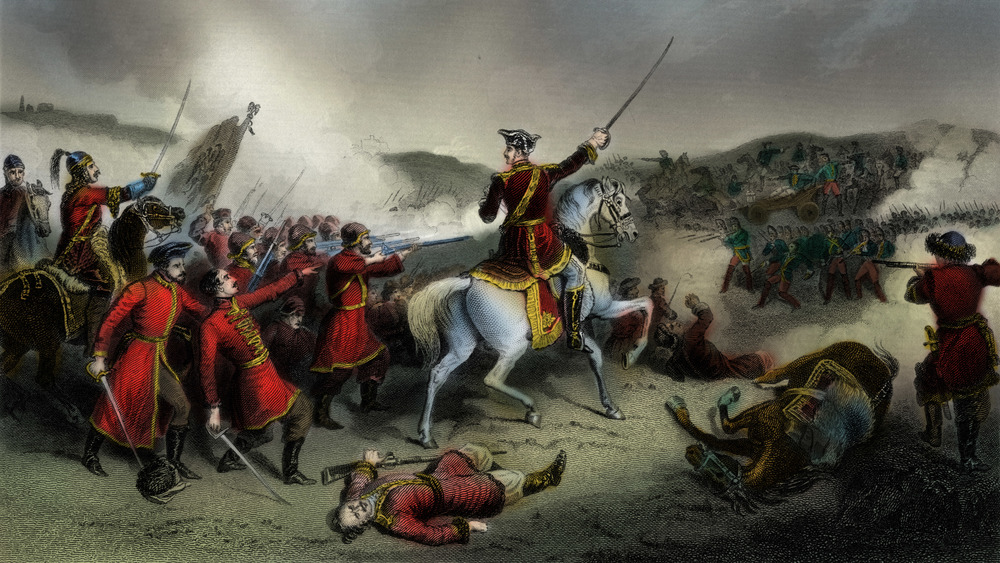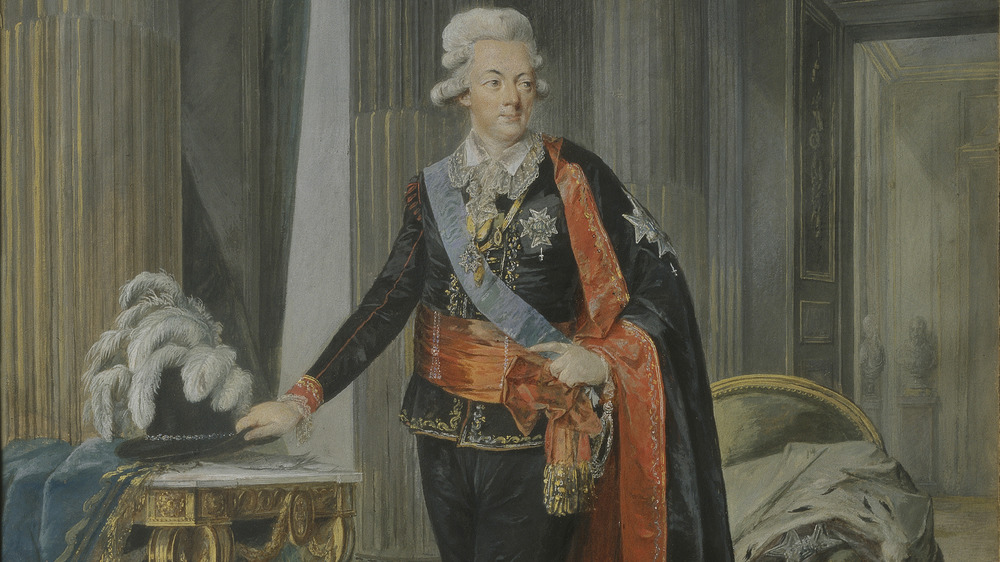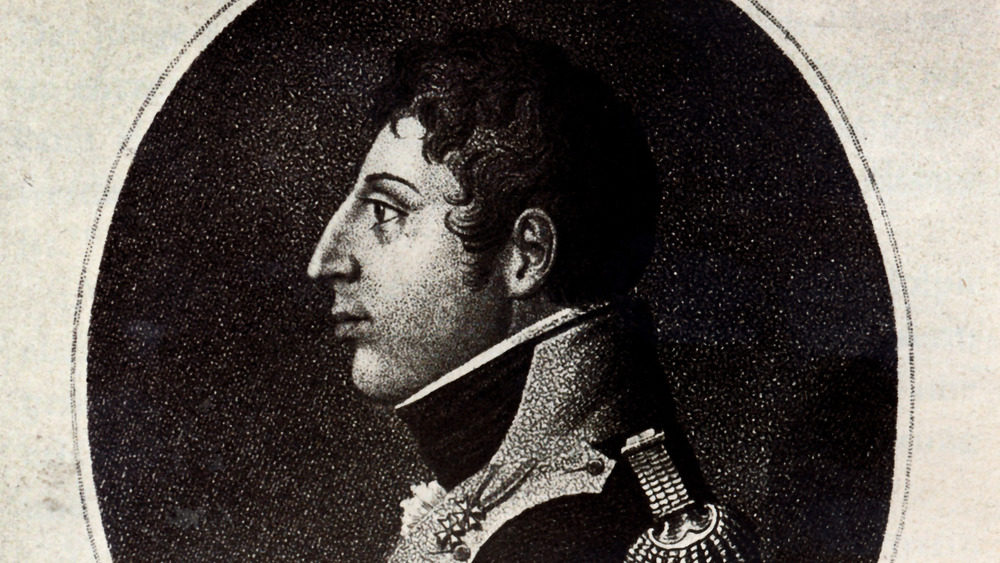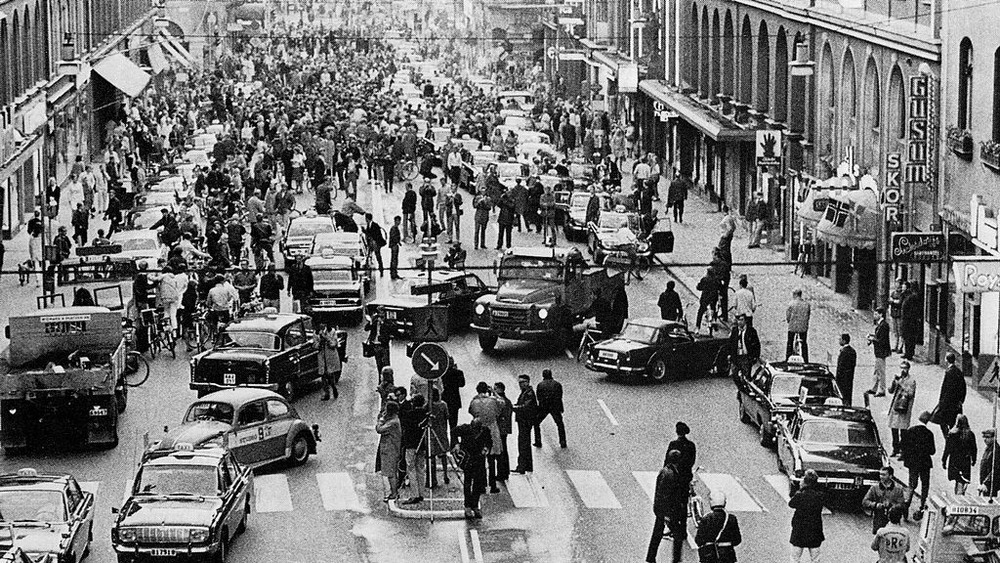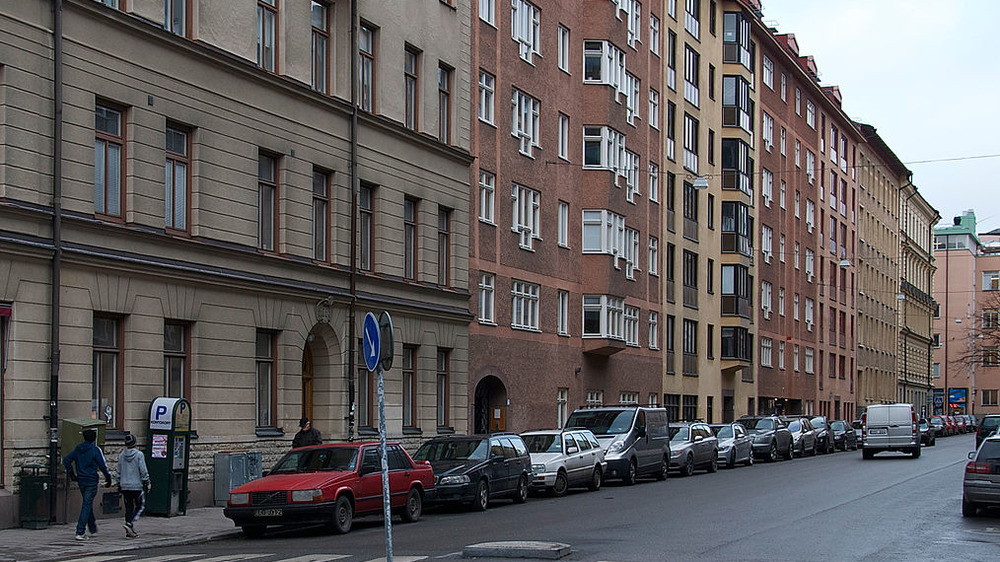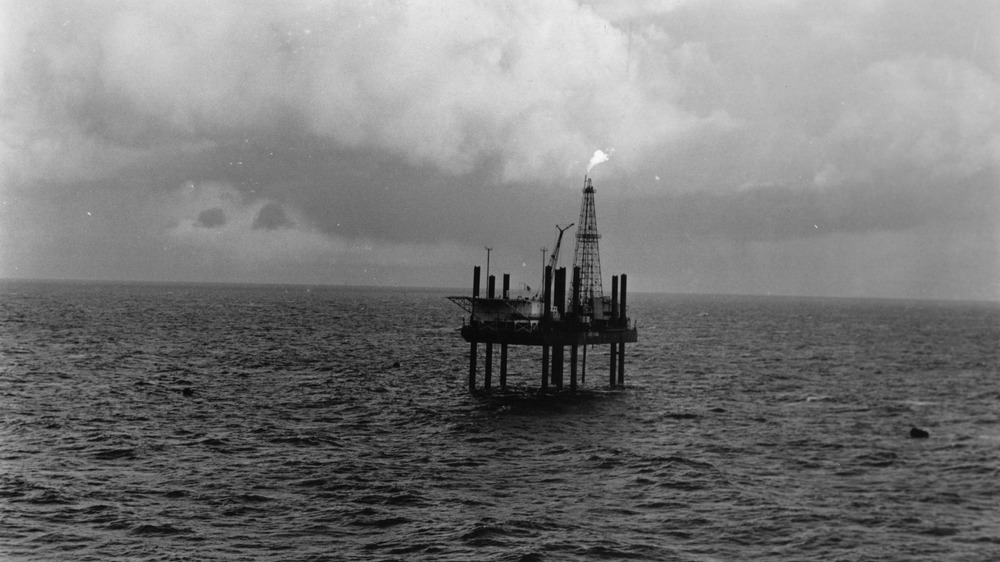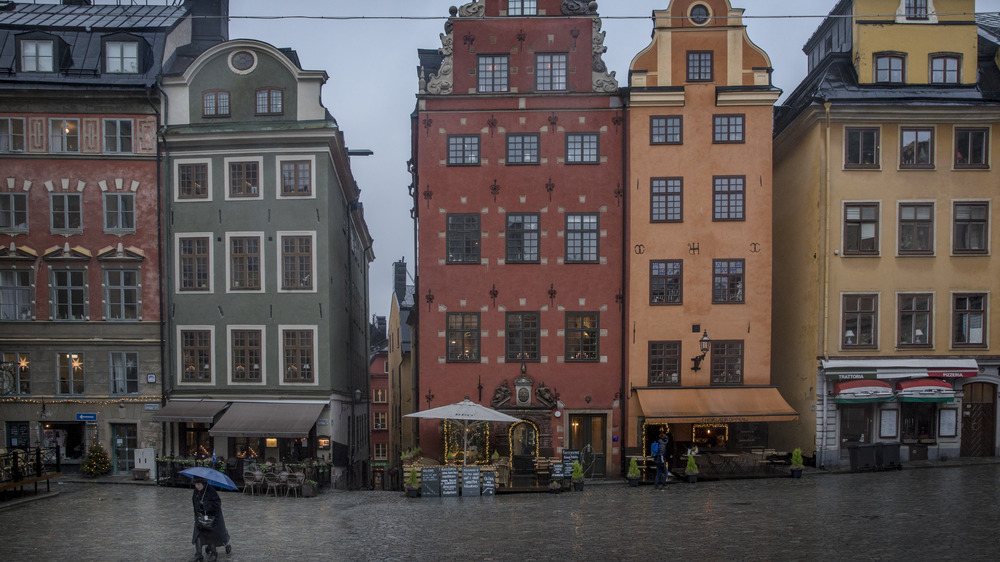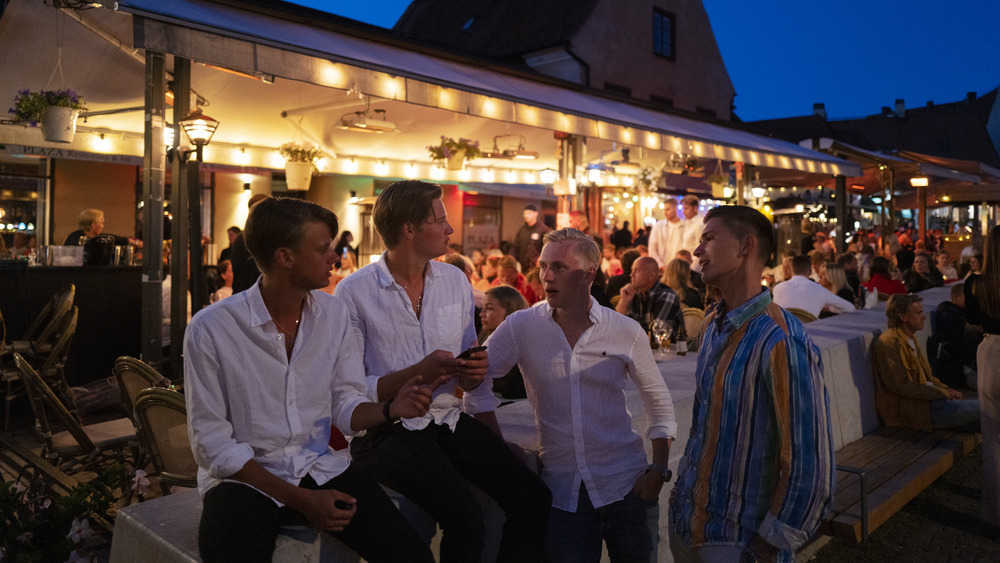Moments In Swedish History That Went Horribly Wrong
If you live outside northern Europe, you probably think of Sweden as a sleepy Scandinavian kingdom where they make boxy cars and furniture that arrives with incomprehensible instructions. You might (mistakenly) believe it has a very high suicide rate, or that it's freezing and covered in snow all the time, or that meatballs are the national cuisine.
While modern-day Sweden — one of the most prosperous countries in the world — is famous for its neutrality through two world wars and has a reputation as a placid, well-functioning modern socialist state, Sweden is actually just as tense and fractured as any other country. The country has seen its share of economic and social unrest in modern times — and things were much worse if you go a little further back in its history. Sweden was once a mighty empire and has had a surprisingly raucous history filled with war, revolution, and some really bad decisions. There have been so many moments in Swedish history that went horribly wrong, it's not surprising at all that the country has settled into its current calm stability. The Swedes are no doubt exhausted. Here are some examples of decisions the Swedes came to regret.
The Stockholm Bloodbath
Any time the word "bloodbath" creeps into your history, you know things have gone sideways. It took Denmark, Norway, and Sweden a long time to sort out whether they were one country or separate entities. Back in the early 16th century, for example, they were part of what's known as the Kalmar Union, which combined the countries under one monarch in a personal union.
As noted by the encyclopedia Britannica, Sweden tried to break free from the Union in 1519, but King Christian II of Denmark invaded Sweden, arrested the rebels, and seemed to have settled the matter. He was crowned king of Sweden in 1520 and threw a lavish feast to celebrate. And then, at the end of the feast, he had about 80 Swedish nobles and religious leaders gathered up and executed in what can only be described as a massacre.
King Christian no doubt expected this would cement his control over the country — but it actually had the opposite effect. As noted by The Local, the bloodbath reignited the Swedish rebellion and made his own nobility quite uneasy, because murdering nobles is generally seen as a bad precedent to support. By 1522 Sweden had won its independence and become a totally independent country. By 1523, Christian was driven out of Denmark. By 1531 he'd been arrested and spent the rest of his life in confinement.
Charles XII's invasion of Russia
The modern geopolitical image of Sweden is one of neutrality. The country refused to take sides in both World War I and World War II and declined to join NATO in 1949, choosing to pursue a policy of "non-alignment." If all you know about Sweden is its recent history, you might think the Swedes are a peaceful people who just want to get along with everyone.
But Sweden was once one of the most warlike countries on Earth — and were once a military superpower that dominated Europe. Until they made the classic mistake of invading Russia.
As noted by the encyclopedia Britannica, King Charles XII ascended to the throne of Sweden in 1697 at the age of 15. With a kid on the throne, its enemies figured 1700 was the ideal year to attack. Instead, Charles turned out to be a military and political genius. As We Are the Mighty reports, over the course of six years of constant fighting he knocked every other country out of the war — and the Russians sued for peace. But Charles, overconfident, refused to make peace. Instead, he invaded Russia.
It was a terrible decision. The Battle of Poltava was a disastrous defeat for Sweden. The army surrendered, and Charles fled. The defeat set off a string of military disasters that eventually destroyed Sweden as a major power — all because Charles snatched defeat from the jaws of victory.
Trying to reform Sweden
Sweden might seem placid in the modern day, but its history is filled with violence and revolutions. Back in the late 18th century, Sweden was still a military force to be reckoned with in Europe, and its kings had a lot of power. Which made King Gustav III pretty confident he could casually change everything about Swedish society via executive order.
According to the encyclopedia Britannica, Gustav had seized the throne in 1771 with the help of the army. The crown had been subordinated to the Rikstag (the legislature) for decades, but Gustav wrested control from the Rikstag. He engaged in a systematic policy of consolidating his own power while introducing reforms. He stripped the nobles of their power and embraced the middle classes. Gustav thought these policies would endear him to the people and solidify his power base.
Gustav was alarmed by the French Revolution and worked to form a league of princes to oppose those sorts of popular revolutions. Gustav aimed to be the sort of enlightened despot who had complete control over his country, but as Unofficial Royalty notes, he moved too far, too fast. The nobility conspired to assassinate him, and Gustav was shot at a masked ball in 1792. The shot didn't kill him immediately, but he developed sepsis and died a few days later.
Sweden gets into another war with Russia
In a geopolitical version of "I can't quit you," Sweden and Russia were bitter rivals for decades. In the early 1800s, Russia entered into a treaty with Napoleon. Napoleon had instituted the Continental System, an economic policy designed to strangle Great Britain. As noted by Russia Beyond, the treaty Russia signed required them to pressure Sweden into complying as well.
But King Gustav IV of Sweden hated Napoleon and thought he had a pretty great army, so he ignored Russia's threats and allied with Britain instead. As detailed by Sveriges Radio, the Russians declared war, and Sweden's defense plan was haphazard and poorly devised. When the dust settled, instead of standing firm against Napoleon and resisting Russia's efforts to meddle in its affairs, Sweden lost the entirety of Finland, which became a Russian duchy.
Gustav thought he would emerge a strong leader and a hero of Sweden. Instead, the crushing defeat transformed the Swedish monarchy into a much weaker instrument of government. Gustav was deposed in a military coup, and his replacement was forced to accept a new constitution that limited the crown's power. Instead of burnishing his own authority and Sweden's influence, Gustav's decision made Sweden weaker and set the crown on a path to being a figurehead.
Mismanaging the Great Deprivation
The word "famine" is sometimes synonymous with historically poor parts of the world, like Africa or the Middle East, not Europe. But famines were once fairly common there as well, and the last major famine in northern Europe — known as the Great Deprivation — saw Sweden make decisions that had some extremely unpredictable consequences.
As reported by historian Donald Harman Akenson, the famine that hit Sweden was the result of harsh winters and incredibly poor harvests. As the country literally starved, the government announced an aid program — but insisted that help would only go to Swedes who agreed to work in exchange for assistance. This caused a great deal of resentment among the citizens, who didn't see the famine as being their fault. The government also won no hearts and minds when it suggested that people survive on "bark bread," made using lichens instead of flour, which made some people violently ill.
According to Augustana College, instead of reassuring the population and inspiring loyalty, these decisions led to a large number of the population to leave Sweden and move to the United States. Between 1850 and 1950, about 1.3 million Swedes emigrated to the U.S. However you spin things, if mass migration is a problem, you're doing it wrong.
The Swedish censorship policy
Americans often think Sweden must be a hotspring of liberalism and socialism. While Sweden is a fairly progressive country, it actually has a deep vein of conservatism embedded in its culture. A perfect example of just how conservative Sweden is the Statens Biografbyrå — aka the Swedish Film Board.
As explained by Sveriges Radio, the Statens Biografbyrå was established in 1911 as film technology first exploded onto the world stage. The board was charged with reviewing every film that was set to be released in Sweden and then issue a license — a license that could (and frequently was) be withheld or adjusted for any number of objections, including sex, violence, or basically anything the board thought unsuitable.
For nearly 100 years the board did just that and regularly banned films that no one else thought particularly racy. As time went on, however, Sweden's heavy-handed approach left it as the only democracy in the world with explicit censorship as a policy — which led to some embarrassing moments. For example, as noted by Den of Geek, in 1982 the board banned ET: The Extra Terrestrial for children under the age of 11 because of the film's "threatening and frightening atmosphere." No, that's not made up.
The decision sparked protests and a conversation about the utility of the board. It was finally disbanded in 2010, by which time advances in home video technology had rendered it more or less powerless.
Being stubborn on the roads
The world is divided into two types of countries — those that drive on the left side of the road like maniacs and those who drive on the right side like normal people. Or maybe it's the other way around — regardless, when cars looked like they were more than a passing fad in 1916 Sweden made the decision to formally become a left-side driving country. As The Volvo Owner's Club reports, the decision made sense because that's the side of the road horses and carriages had been using.
Sweden maybe should have consulted with the countries it borders, however, all of which became right-side driving countries. As the BBC notes, this caused significant safety and logistical problems as car ownership increased. Fatal traffic accidents surged, as did collisions along the borders with Finland, Norway, and Denmark. This was exacerbated by the fact that almost every car driven in Sweden was designed for right-side driving, making the safety issue even worse.
Fifty years after the hasty decision to drive on the left, Sweden decided to save some lives and fix their tragic mistake. As The Washington Post reports, Sept. 3, 1967, was designated "Dagen H" (Dagen means "day" and the "H" means Högertrafik, or "right-hand traffic"). Hundreds of thousands of signs had to be changed, but when the moment came it was a matter of about ten minutes to switch everyone over to the right-side.
Trying to modernize Stockholm, Sweden
Stockholm dates back to the 13th century. Over the centuries it has experienced different bursts of construction following vastly different codes. In the 1970s, the municipal housing authority in the city decided that it was time to tear down a block of buildings known as Mullvaden.
As noted by Sveriges Radio, however, this seemingly innocuous bit of city planning sparked a huge protest. Hundreds of people flocked to the Mullvaden apartments and began squatting there to prevent the city from tearing them down. They weren't trying to save four old, structurally unsound buildings, however. They were protesting the way the city kept selling public property (and housing) to private interests, steadily reducing the available rentals and making it harder and harder for non-wealthy people to live there.
The squatters lived in the old buildings for 11 months. Finally, the police stormed in and dragged them out, and the city began demolition just a few hours later to prevent anyone from sneaking back in. But while the protesters lost the battle, they won the war, because Mullvaden marked the last time Stockholm attempted to clear out older buildings simply by condemning them. Mullvaden were the last four houses to be torn down in southern Stockholm.
Rejecting Norway's oil
Norway and Sweden were once part of the same country, and they still share many cultural aspects. In recent years, Norway has become much wealthier than Sweden despite their similarities because it has vast offshore oil reserves — oil that Sweden could have owned a part of.
As reported by Business Insider, in the 1970s Norway was in a pickle. Its industrial sector lagged behind the other Scandinavian countries, and its economy was struggling. It knew there was oil in the North Sea, but it didn't know how much, and setting up drilling operations would be expensive. So Norway proposed a deal — it offered Sweden a piece of the oil fields in exchange for lumber and a 40% stake in Volvo.
Sweden said no. More specifically, Volvo said no — the board needed 66% of shareholders to approve the deal, but only got 60% to agree, and everything fell through.
The value of those oil concessions would probably be close to $100 billion today. Meanwhile, Volvo was sold to Ford Motor Cars for $6.45 billion in 1999 — and to Chinese investors for just $1.5 billion in 2010. The huge oil reserves in the North Sea proved to be incredibly valuable, and Norway is now much wealthier than Sweden.
Sweden almost went to war over fish gas
Sonar is as much an art as a science. Sounds traveling underwater are very different from those traveling through the air, and even highly trained operators can sometimes get confused about what they're hearing. Computers can help, but even then mistakes can be made, as dramatized in the film The Hunt for Red October, when a highly advanced computer identifies the sound of a new type of submarine as "magma displacement."
It was exactly this sort of confusion that almost got Sweden into a war with Russia in the 1980s. As reported by Russia Beyond, a Russian submarine got stranded accidentally in Swedish waters in 1981. The Swedes helped the Russians free the ship, and the Russians apologized and went on their way. But the incident made the Swedish a little paranoid about Russian subs lurking in their waters. This fear seemed to be backed up when the Swedish military began detecting mysterious noises in the water accompanied by bursts of bubbles. The Swedish prime minister sent the Russian president a nasty note accusing the Russians of spying and violating international law, and relations between the two countries seemed to be inching towards a hot war.
And then some scientists figured out the sound was made by a fish called a Baltic herring — specifically, the sound was the fish passing gas. Which also explained the bubbles. Sweden backed off, and everything went back to normal.
The ongoing housing crisis in Sweden
It often takes decades for the full implications of government policies to become clear. As noted by S&P Global Market Intelligence, after World War II, Sweden introduced several housing policies designed to foster a more equal society. These included rules against long-term rental of apartments and strict rent regulation.
These policies have contributed to a housing crisis that just keeps getting worse. As Reuters reports, the wait list for public housing in parts of Stockholm are as long as 30 years, and the rent regulations have only served to create a lucrative market for illegal sublets where the actual rents are much higher than the legal limit. At the same time, the credit rules in Sweden make it very difficult to qualify for a loan, making it nearly impossible for regular people to purchase property. After a recent boom in construction, many new apartments are empty simply because literally no one can afford to buy them.
And as the BBC notes, the government has also simply failed to build enough public housing to accommodate a fast-growing population. As more people move to Stockholm and other areas of the country, property costs continue to rise — 14% in 2016 alone — exacerbating the problem. Sweden intended to create a level playing field but has instead made finding housing a nightmare.
Their herd immunity COVID strategy
When the COVID-19 coronavirus pandemic hit the world, different countries reacted in different ways, generally with different combinations of lockdowns, mask mandates, and other policies. Sweden stood out because they chose to ... do nothing. As reported by The Washington Post, even as the virus hit Sweden's nursing homes very hard, the country implemented almost no restrictions. This was a deliberate decision to favor the economy over protecting people's health and led to images of relaxed Swedes out socializing and enjoying themselves while most of the rest of the world sat on Zoom calls, baked bread, and grew out their beards.
As the next wave of the pandemic slams the world, however, Sweden is admitting its approach did not work. As Bloomberg reports, even King Carl XVI Gustaf, who normally tries to stay out of politics, described the country's pursuit of "herd immunity" (in which a majority of the population contracts and survives the virus, gaining a natural resistance to it) has "failed."
The country has reversed many of its controversial policies, implementing restrictions on public gatherings and alcohol sales. But the damage may be done. MSN reports that Swedish life expectancy will probably drop for the first time in 100 years as a result of the pandemic — and Sweden's bizarre response to it.
